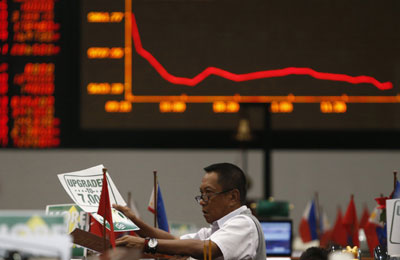
Exodus from emerging currencies, stocks
London, June 13, 2013
Equities in emerging markets slumped 2 percent to 11-month lows on Thursday and local currencies slid as investors piled into the relatively safe Japanese yen, driven by fears of future global central banks' moves.
Central banks from India to Turkey have acted this week to stem currency losses and on Thursday the Indonesian rupiah was buoyed by a surprise central bank rate rise.
Investors were unwinding short bets on the yen - which surged 1 percent on the dollar - and long positions on equities, pushing the Nikkei down more than 6 percent.
Markets are being rattled by uncertainty over the next moves of central banks in Japan and well as the United States.
The latest asset shifts bring year-to-date losses on MSCI's emerging equity index to more than 11 percent while sovereign dollar bond yield spreads widened 4 basis points to 348 basis points over Treasuries, around the widest in a year .
Emerging assets are likely to stay under pressure at least until the Federal Reserve's meeting next week when the bank could provide clarity about scaling back its bond-buying plan.
"We are seeing an unwinding of carry trades in the FX space and that is impacting most emerging markets and especially high-yield currencies," said Murat Toprak, emerging markets strategist at HSBC in London.
Carry trades involve borrowing in low-yielding currencies to by assets in higher-yielding ones.
"The expectation had been of outflows from Japan towards the emerging markets space but we are seeing the opposite," Toprak said.
DUMPING ASIA
Foreign investors were dumping Asian stocks, pushing the Seoul market to seven month lows while Shanghai fell almost 4 percent and the Bangkok market lost 5.5 percent.
Emerging currencies too saw big losses, forcing several central banks to wade in. The Indian rupee hit fresh record lows despite central bank action in the previous session while Indonesia raised interest rates in a move seen motivated by the need to defend rupiah which is 3-1/2 year lows
South Korea held interest rates steady and analysts expect India to keep policy stable on Monday to support the rupee.
"The key point is US yields. If they keep going up, EM currencies cannot hold up. Central banks are responding in a conventional way.. trying to ease volatility," Toprak said.
The currency losses are also linked to selling of local currency debt, where yields on the main GBI-EM index are at 6.18 percent, a percentage point higher than early May levels indicating selling.
Emerging European assets were less hard hit however though the Russian rouble fell half a percent along with a 1 percent equity fall that took the market to new one-year lows . The Polish zloty fell 0.4 percent.
Turkish stocks however rose 1 percent and the lira firmed slightly on the back of a slightly calmer political situation. The forint rose 0.2 percent as markets priced out further interest rate cuts. - Reuters







